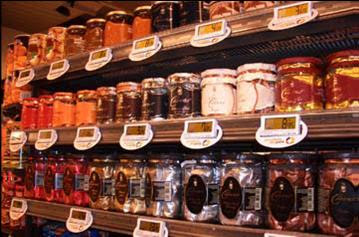Sainsbury’s Dartmouth store is run on renewable energy, reducing CO2 emissions by 40%.
Sainsbury´s opened a new flagship green store in Dartmouth, Devon (United Kingdom), in August 2008. Built with respect for the use of natural resources, including energy, water, waste, timber and land, the store was specifically designed to reduce both its operational and embodied carbon.
The pioneering store will save 40% of its overall CO2 emissions, achieved by the use of cutting edge technology. The store’s ‘biomass boiler' will heat both the building and water, using locally sourced wood that would otherwise be wasted. By using renewable energy, the amount of energy consumed from the national grid has been dramatically reduced by 50%.

Sainsbury's Dartmouth has been designed to leak fewer draughts and employs other measures, such as 'quiet revolution wind turbines' ™, to power the checkouts. This is contributing to cutting electricity usage (kWh) by a third overall.
Further carbon savings are made through the use of lower lighting levels and increased use of daylight, and cool air will be collected from chillers to keep the store cool during warmer months.
Rainwater harvesting is one of the techniques being used to reduce water consumption. Collected rainwater is used to flush customer and colleague toilets, and to irrigate plants. The store will save over one million litres of mains water every year, and uses 60% less water overall as a result.

The store's construction is also environmentally responsible, and where possible recycled or recyclable materials have been used or FSC-approved timber. As 200 trees have been used for the frame of the store, Sainsbury's will also re-plant 400 trees in the local community.
The Dartmouth store is an important stage in the plans to roll out sustainable features to the remainder for further expansion of Sainsbury´s in the United Kingdom. These plans make a significant contribution to their overall target to reduce CO2 emissions per square metre by 25% by 2012.
More information on http://www.j-sainsburys.co.uk/










































